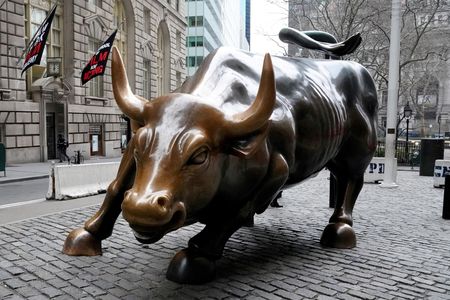By Lewis Krauskopf
NEW YORK (Reuters) – Investors grew more upbeat about a year-end U.S. stock rally after a softer-than-expected inflation report on Tuesday lifted sentiment a day ahead of a Federal Reserve decision that looms as a second major test for markets this week.
December is traditionally a rosy time of the year for stocks, but the month had gotten off to a rocky start with the S&P 500 last week posting its biggest weekly drop since late September as investors pared risk from portfolios ahead of potentially market-moving events.
November’s consumer price index released on Tuesday showed a smaller-than-expected rise for a second straight month, fueling optimism that the Fed would scale back its interest rate hikes that have punished asset prices this year.
“This was a big week, and this is certainly passing the first test,” said Brent Schutte, chief investment officer at Northwestern Mutual Wealth Management Company.
“We will see what happens tomorrow, but I do think you will have a Federal Reserve that talks more balanced,” Schutte said. “It sets up for year end that has a positive tailwind towards it as we all … continue to see the writing on the wall for inflation in 2023.”
The CPI rose 0.1% last month, against a 0.3% rise expected by economists polled by Reuters. In the 12 months through November, the CPI climbed 7.1%, the smallest advance since December 2021.
Stocks jumped after the report with the S&P 500 last up 0.8% in afternoon trading. The benchmark index has rallied about 13% from its 2022 low reached in October, helped by back-to-back softer inflation reports, although it remains down 15% for the year.
The latest CPI report also prompted a further reversal of other market trends that prevailed for much of 2022, with U.S. Treasury yields falling and the dollar weakening on Tuesday.
The S&P 500, last down about 1.5% so far this month, has risen an average of 1.5% in December since 1950, the third-best performance of any month, according to the Stock Trader’s Almanac.
Investors that had cut down equity positions and beefed up cash reserves have shown a tendency to jump aboard stock rallies in recent months, helping amplify upside moves in equities.
A UBS proprietary measure published on Friday showed that equity positioning among active fund managers was substantially below average but above the historical lows reached a few weeks ago.
“Positioning is still pretty bearish and this was certainly not one to help the bear camp out, so the risk is we squeeze (higher) into the end of the year,” said Jack Janasiewicz, portfolio manager at Natixis.
Still, the outcome of the Fed’s two-day meeting starting Tuesday poses an obstacle for stocks, with investors bracing for more volatility. Options prices are projected to swing roughly 1.8% in either direction for the S&P 500 in the hour immediately following the Fed’s decision on Wednesday, according to data earlier this week from options market-making firm Optiver.
Investors are largely factoring in a half-percentage-point rate hike, a step down from the Fed’s recent series of three-quarter-point increases.
Wall Street instead will be focused on the central bank’s projections for how high rates will ultimately rise. On Tuesday, traders boosted bets that cooling inflation will allow the Fed to continue to taper its rate hikes into next year and likely end them in March.
While stocks could rise as the year ends, many investors are cautious and worry that the delayed effects of interest rate hikes will severely wound the economy. The S&P 500 is expected to end 2023 at 4,200, or about 5% above Monday’s closing level, according to a Reuters poll of strategists.
“The lagged effects of Fed tightening are still looming in 2023 and the economy appears to be slowing on its own, lending to elevated recession risks in our view in the coming year,” said Josh Jamner, investment strategy analyst at ClearBridge Investments.
(Reporting by Lewis Krauskopf; additional reporting by Saqib Iqbal Ahmed; Editing by Alden Bentley and Richard Chang)

